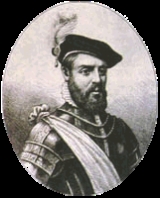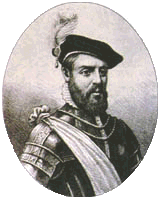
Juan Lopez de Padilla
Encyclopedia

Castilian War of the Communities
The Revolt of the Comuneros was an uprising by citizens of Castile against the rule of Charles V and his administration between 1520 and 1521. At its height, the rebels controlled the heart of Castile, ruling the cities of Valladolid, Tordesillas, and Toledo.The revolt occurred in the wake of...
, where the people of Castile
Castile (historical region)
A former kingdom, Castile gradually merged with its neighbours to become the Crown of Castile and later the Kingdom of Spain when united with the Crown of Aragon and the Kingdom of Navarre...
made a stand against policies of the Holy Roman Emperor
Holy Roman Emperor
The Holy Roman Emperor is a term used by historians to denote a medieval ruler who, as German King, had also received the title of "Emperor of the Romans" from the Pope...
Charles V
Charles V, Holy Roman Emperor
Charles V was ruler of the Holy Roman Empire from 1519 and, as Charles I, of the Spanish Empire from 1516 until his voluntary retirement and abdication in favor of his younger brother Ferdinand I and his son Philip II in 1556.As...
and his Flemish ministers.
Padilla was the eldest son of the commendator of Castile. In 1520, after the Castilian deputies had demanded in vain Charles V's return to Castile, regard for cortes
Cortes Generales
The Cortes Generales is the legislature of Spain. It is a bicameral parliament, composed of the Congress of Deputies and the Senate . The Cortes has power to enact any law and to amend the constitution...
' rights and the administration of their economy by Spaniards, a "holy junta" was formed with Padilla as its head. At first, the junta attempted to establish a national government in the name of Juana of Castile, but lost the support of the nobility
Nobility
Nobility is a social class which possesses more acknowledged privileges or eminence than members of most other classes in a society, membership therein typically being hereditary. The privileges associated with nobility may constitute substantial advantages over or relative to non-nobles, or may be...
when it abolished their privileges and asserted democracy
Democracy
Democracy is generally defined as a form of government in which all adult citizens have an equal say in the decisions that affect their lives. Ideally, this includes equal participation in the proposal, development and passage of legislation into law...
. Though the nobles' army subsequently captured Tordesillas
Tordesillas
Tordesillas is a town and municipality in the province of Valladolid, Castile and León, central Spain.It is located 25 km southwest of the provincial capital, Valladolid at an elevation of 704 meters. The population was c. 9,000 in 2009....
, Padilla led the capture of Torrelobatón
Torrelobatón
Torrelobatón is a municipality located in the province of Valladolid, Castile and León, Spain. According to the 2004 census , the municipality has a population of 577 inhabitants....
and other towns, but any advantage gained was neutralized by the junta after it granted an armistice
Armistice
An armistice is a situation in a war where the warring parties agree to stop fighting. It is not necessarily the end of a war, but may be just a cessation of hostilities while an attempt is made to negotiate a lasting peace...
. When hostilities resumed, their army was comprehensively defeated near Villalar on April 23, 1521 and Padilla taken prisoner. He was publicly beheaded the following day.
Afterwards, Padilla's wife, Doa María Pacheco, bravely defended Toledo against the royal troops for six months, but ultimately was compelled to take refuge in Portugal
Portugal
Portugal , officially the Portuguese Republic is a country situated in southwestern Europe on the Iberian Peninsula. Portugal is the westernmost country of Europe, and is bordered by the Atlantic Ocean to the West and South and by Spain to the North and East. The Atlantic archipelagos of the...
.
Further reading
- Sandoval, Historia de Carlos V., Pamplona: 1681.
- E. Armstrong, The Emperor Charles V., 1902.
- A. Rodriquez Villa, Juana la Loca, Madrid: 1892.
- Pero Mejia, "Comunidades de Castilla", in the Biblioteca de autores espafloies of Rivadeneyra, vol. xxi.

